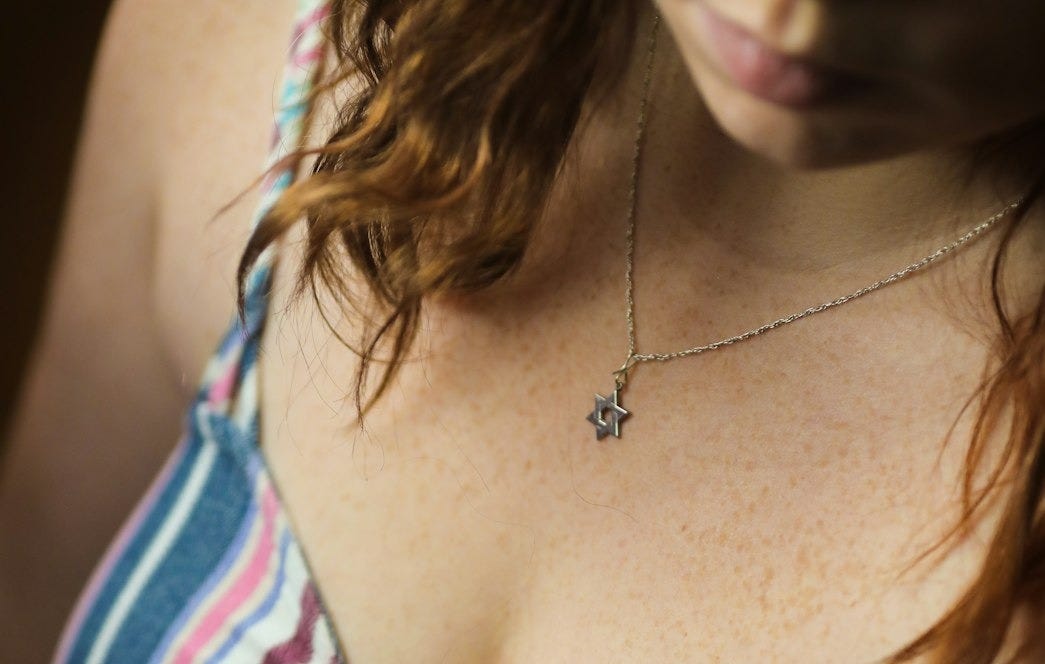This essay is part of a new collection of work inspired by the anthology On Being Jewish Now: Reflections of Authors and Advocates. Want to contribute? Instructions here. Subscribe here.

I run my fingers over the bare skin on my chest; the space exposed by the v-cut neckline of my blue dress looks empty.
“I forgot my Star of David,” I say to my parents. “It would have been perfect for this.”
It’s Rosh Hashanah, and I’m home from college for my cousin’s baby shower.
“You know you can wear your necklace anytime,” my mom says. “It doesn’t have to be a special occasion.” My mom—my lovely Catholic mom—says I can wear my necklace anytime, not just when I’m around other Jews. But I don’t see the point in wearing a charm I’m going to keep tucked beneath my shirt.
Weeks later, I’m on a trip with friends when I hear that Israel has been attacked. The next day, I see the headline: “Israel Declares War on Hamas.” When I get back to my apartment, I unbury that necklace from the bottom of my bathroom drawer and hang it around my neck. My grandmother gave it to me for my bat mitzvah when I was 13, but I’ve hardly worn it in the eight years since. I pinch the clasp and admire how the gold box chain falls over my collarbone, how the flat Star of David clings to the center of my chest. But the next day, on my walk to class, I slip the small, pointy charm beneath my shirt.
Growing up, my mom was overprotective. I wore a bicycle helmet longer than my friends, got picked up from parties before everyone else, and always had to tell her where I was going. So, I wonder now, why am I hiding this necklace, this representation of my identity, when my mom—who cares more about my safety than anything else—is saying it’s safe?
As I sit in my undergraduate English class that first weekday after October 7, I overhear classmates talking about current events.
“None of my friends have disappointed me yet,” one girl says, referring to the lack of support her friends have expressed for Israel. Other peers nod along. Instinctively, I bring my hand to my chest, making sure that my Star of David is still hidden.
Over the next few weeks, as I feel more ostracized from my classmates and grow increasingly insecure about projecting my Jewishness, my mom becomes a bigger supporter of the Jewish people than most Jews I know. My roommates and close friends share this kindness towards me; they check in when campus protests get out of control and when people we know express a desire for violence against Jews. When a non-religious friend hears about someone bad-mouthing Jews, saying you “can’t trust them,” she stands up for me better than I do. I come to understand that you do not have to be Jewish to care about the rise in antisemitism. You just have to love someone who is.
Still, I keep my necklace tucked in. Some days, I put on a top with a low-cut neckline, glance in the mirror, see that shiny star on my chest, and change into something else. I don’t want my necklace to show, but I’m afraid to admit it. I would rather pretend it just happened to slip beneath my collar. And then I encounter a boy in the elevator, or a girl in my writing class, with their stars proudly visible, and I wonder if it would be too obvious for me to stick my hand beneath my shirt and expose mine, right then and there, so they know that I am one of them.
Occasionally, I take the necklace off to sleep or shower, but when my hands run up my chest without encountering that gold chain, I grasp around frantically, worrying that I’ve lost it. No matter how many layers of clothing I’m wearing, I feel naked without that Star of David around my neck.
When the winter holidays roll around, I ask my parents for a gold chai charm. The symbol חי, which means “life,” is less obvious than the Star of David. I have one in silver, from a shuk in Tel Aviv, but I want one to hang on the gold chain my grandmother gave me.
The eight nights of Hanukkah come and go, and I figure I’ll have to hold out longer before I can wear low-cut shirts again. But then, on Christmas morning, my mom hands me a box. In it is a delicate gold charm that could easily slip through my fingers. I breathe a sigh of relief before I unclasp the chain around my neck, let the Star of David fall off, and slide on the חי.
“Some people wear the Star of David and the chai on the same chain,” my mom says over Christmas morning cinnamon rolls. “You don’t have to pick one.” I smile back, but I have no intention of wearing both.
When I return to school in January, I wear whichever shirt I want and let my necklace fall wherever it does. Many people don’t recognize the symbol. Some think it’s some kind of animal. Protestors who openly chant against the Jewish people don’t realize that one of our most beloved words means “life.” They have no idea that on chains falling so close to our hearts, we are carrying a חי.
Catherine Cahn is a Los Angeles-based writer with a love for travel, food, and doing things outside. She grew up Jewish in the South, an experience which informs much of her work—both fiction and personal essays—and seeks a Jewish community wherever she goes.
Instagram: @catherinecahn
This essay is part of a new collection of work inspired by the anthology On Being Jewish Now: Reflections of Authors and Advocates. Want to contribute? Instructions here. Subscribe here.


